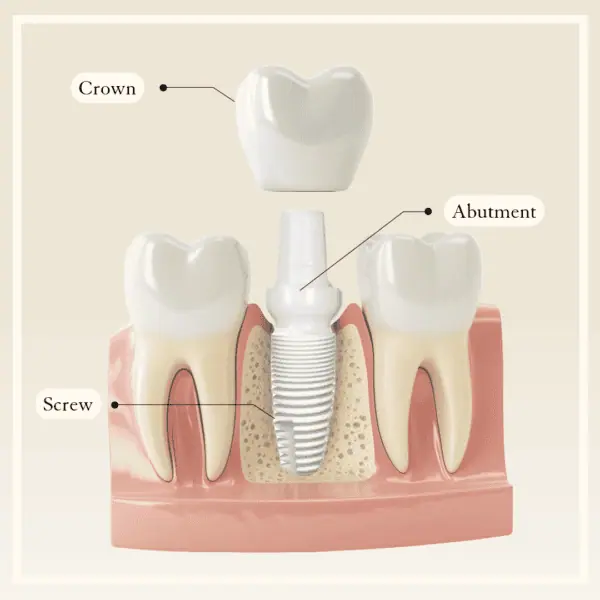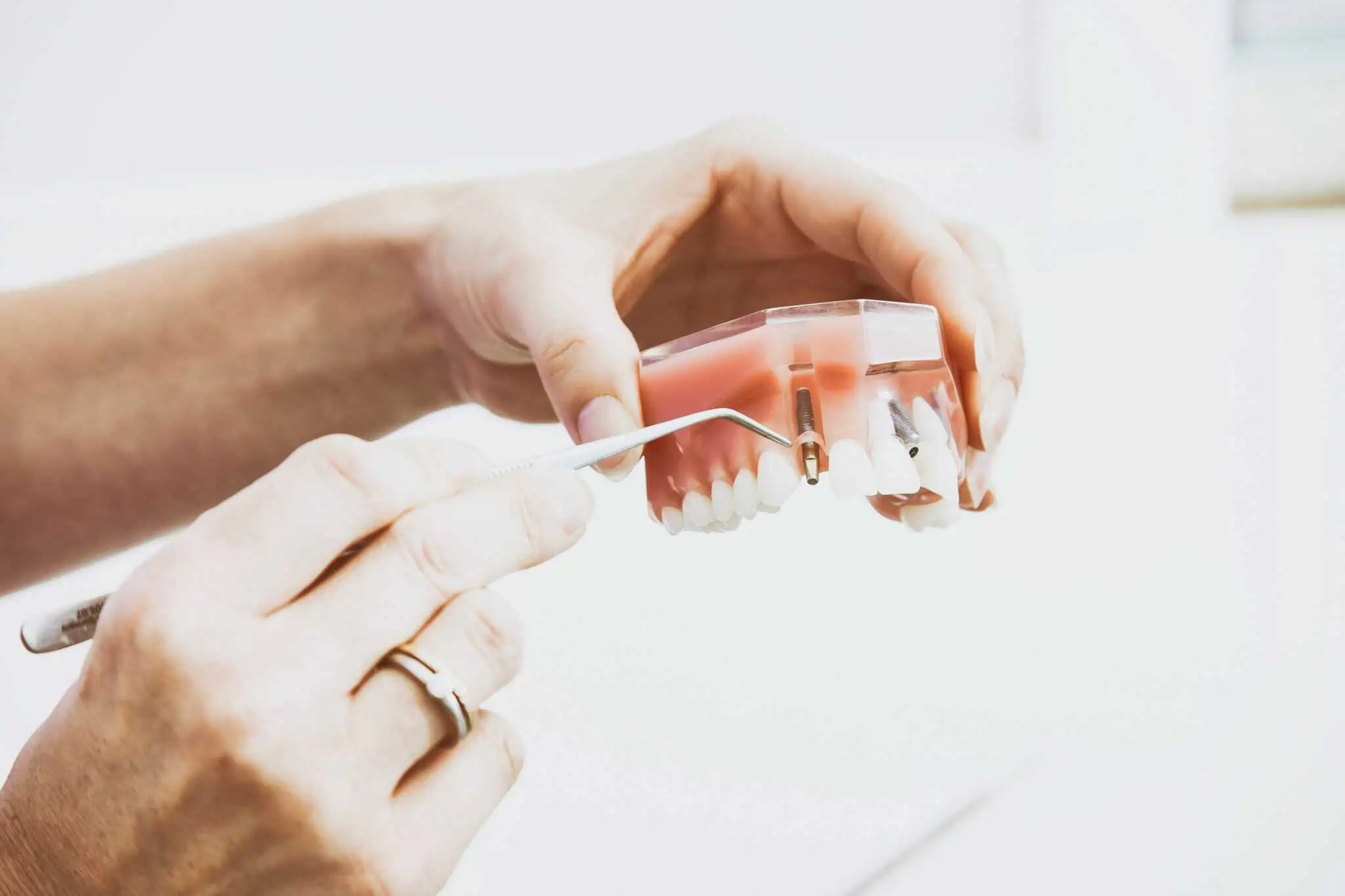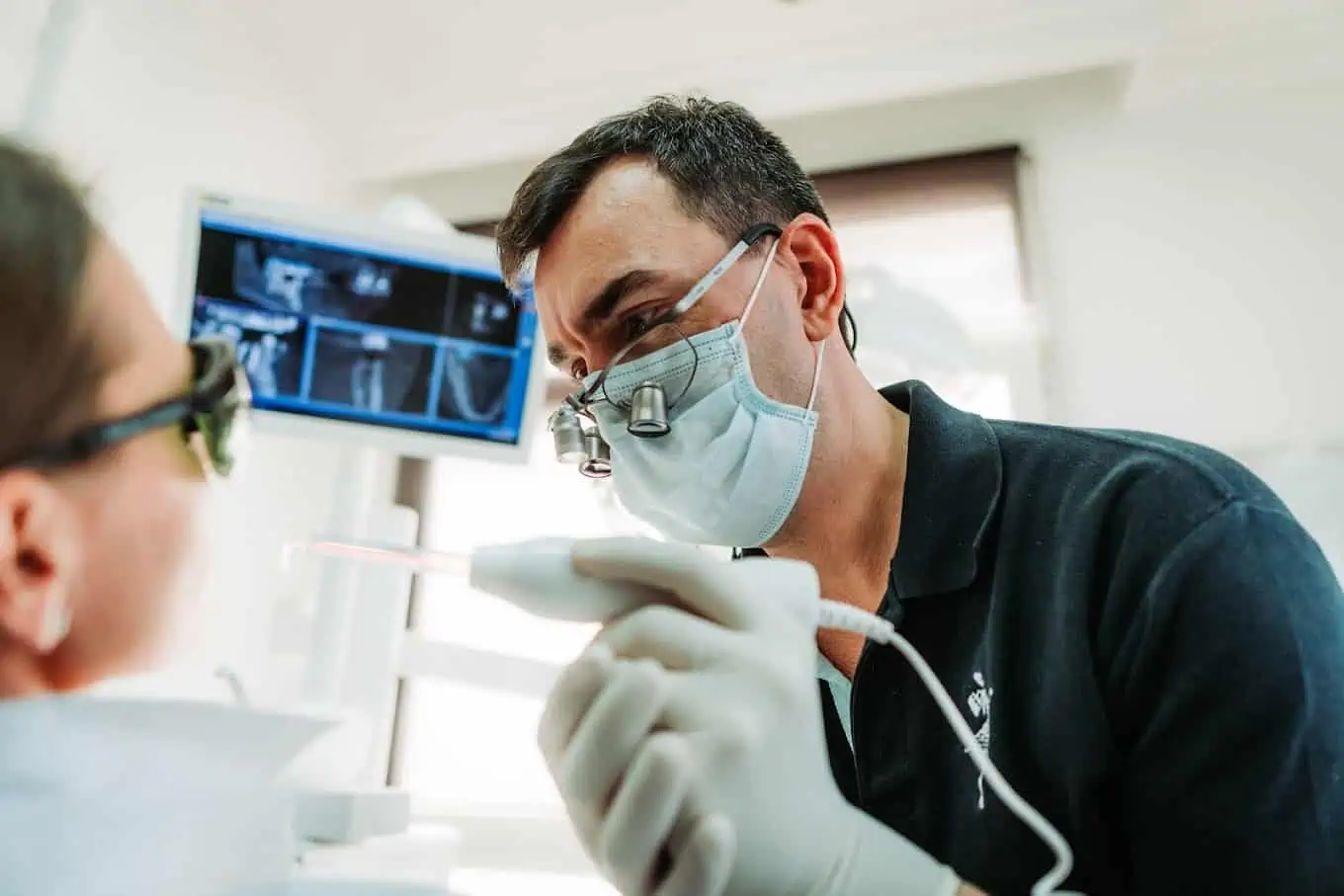Dental implants have revolutionized the field of dentistry, offering a permanent solution for missing teeth that looks, feels, and functions like natural teeth. At ROZE BioHealth and BioDental Clinics, we specialize in providing best-in-class dental implant treatments, with a biological (a.k.a. holistic) approach, ensuring that our patients receive the highest quality care from start to finish.
If you’re considering or have been referred to an oral surgeon for a dental implant, read this first. This comprehenseive guide walks you through everything you need to know about dental implants, including your options, the benefits, the procedure, and some recovery tips from our very own biological dentists.
First, what are dental implants?
Dental implants are artificial tooth roots made of biocompatible materials, such as ceramic, that are surgically placed into your jawbone. They provide a stable foundation for fixed or removable replacement teeth, like crowns or bridges.
Over time, the bone cells attach themselves directly to the implant surface (a process known as osseointegration) essentially locking it into the jawbone and ensuring a secure and long-lasting fit.
Osseointegration is critical for implant stability, and is considered a prerequisite for implant loading and long-term clinical success of endosseous dental implants.1
The anatomy of a dental implant

- Implant fixture: This is the titanium or ceramic screw that acts as a substitute to your tooth’s natural root.
- Abutment: Serves as a connector between the dental implant and the final restoration, be it a crown or bridge.
- Crown: Visible part of the implant (what you’ll see as the “tooth”); enacts natural teeth and restores the look and function of your smile.
Types of dental implants: titanium vs. ceramic
Dental implant surgery, like any medical procedure, is an investment on your overall health. Discuss with your dentist (preferably a biological one) the pros and cons of titanium vs. ceramic implants to decide which is best for you based on your medical condition and health goals. And remember, you can never ask too many questions!
We’ve outlined some of the pros and cons for you here, for both titanium and ceramic implants.
Titanium implants

Pros:
- Extensive long-term research: Titanium implants have been around in dentistry for a while, with long-term studies of over 30 years available.
- Versatility: They’re suitable for most patients, including those with complex dental conditions.
- Biomechanical properties: Titanium is a strong, durable metal with excellent resistance to fracture and high bite forces.
Cons:
- Metal sensitivity: A small percentage of patients may experience a hypersensitive reaction to titanium or other metals used in dental implants. This can lead to complications such as inflammation, pain, or even implant failure in some cases.2
- Aesthetics: In some cases, the metal may show through the gum tissue, which can be a concern for patients with thin gums.
- Soft tissue regeneration: The bone and gums do not regenerate as effectively with titanium implants compared to ceramic ones.
Ceramic implants
Pros:
- Biocompatible and metal-free: If you’re concerned about health risks of putting metals in your mouth (think titanium implants or mercury fillings3,4), ceramic implants are a more natural and biological alternative to dental prosthetics.
- Hypoallergenic: Some patients may have a hypersensitive reaction to titanium. Unfortunately, surgeons often discover this only once the titanium implant has been placed. In fact, studies have shown that nearly half of these patients with allergic reactions developed the sensitivity to titanium after having the implants placed5. Because zirconia, a type of ceramic material, is a clean and metal-free option, it’s ideal for patients with hypersensitivity to metals.
- Better bond with bone: Overall osseointegration with the bone has been found to either be similar to or better than titanium implants when using ceramic6. This is ideal for patients who have had failed implants and need a more stable solution to their oral health needs.
- Aesthetics: Ceramic dental implants are more aesthetically-pleasing due to their tooth-color and smooth finish. The zirconia also stays a gorgeous, natural white throughout the years, making them an excellent choice for front replacements.
- Reduces plaque accumulation: Due to its smooth finish, ceramic implants reduce the adhesion of plaque and bacteria. This prevents failure of the implant due to bacteria and inflammation.
- High endurance: Ceramic implants have a higher endurance compared to metal ones. They can endure up to 150 pounds of force before fracturing and cracking!
- Soft tissue integration: Gums love ceramic. The new surfaces of zirconia implants are evolving to improve integration and tissue response more similar to a natural tooth.
Cons:
- Cost: Ceramic implants are more expensive than their titanium counterparts due to the high costs of manufacturing these type of implants.
The benefits of dental implants
Dental implants can greatly enhance your health and quality of life, especially when your oral health requires them. By seamlessly integrating with your oral health routine, implants eliminate the need to modify adjacent teeth, promoting long-term dental and holistic well-being. Their exceptional durability means that, with proper care, they can last a lifetime, making them a valuable investment in both your health and self-esteem.
Some benefits include:
- Improves quality of life: Restores your ability to chew, helps keep the jawbone from shrinking due to bone loss
- Enhanced oral health: Helps keep adjacent teeth stable, preserves the health of the surrounding bone and gums.
- Restores cosmetic appearance: Dental implants look and feel like your own teeth, boosting your confidence.
- Durability: With proper care, implants can last a lifetime.
Dental implant protocol at ROZE BioHealth and BioDental Clinics

We’ve gone over what dental implants are, the pros and cons of ceramic vs. titanium implants, and their overall benefits. Now, here’s a glimpse into what the patient journey looks like at ROZE BioHealth and BioDental Clinics for those undergoing dental implant surgery.
Keep in mind that each patient is unique and our treatment plans are tailored to their specific needs.
Amazing organic treatment and implant made by Dr. Carla & Dr. Sulaiman, absolutely no pain, very good follow up. Thanks to the lab team as well, amazing job!
– Julien Meyer, dental implant patient
1. Initial consultation
During your first visit, your oral surgeon will conduct a thorough examination, including X-rays and 3D imaging, to assess your dental health and determine whether implants are the right solution for you.
What sets us apart? Our biological approach.
We’ll take a closer look at the bigger picture: you as a whole. During your initial consultation, your doctor will request blood tests for insights on what will be beneficial for your bone and to check other internal parameters. Our whole-body approach ensures that your body is able to withstand the procedure and easily accept and integrate the implant.
2. Treatment planning and prep
Based on your examination results, your doctor will develop a personalized treatment plan, outlining the number of implants needed, the type of implant (ceramic or titanium), placement strategy, as well as treatment or therapy needed to prepare your body for surgery.
For example, you’ll be referred to our dental hygiene team for a biological cleaning using ozone for a full-mouth disinfection. Your doctor may also prescribe vitamins to replenish deficiencies, or lifestyle changes to enhance your overall well-being. Remember, we want a strong and healthy mind and body (especially the bone and gum) before going in!
3. Implant placement
The implant placement procedure is typically performed under local anesthesia. Your skilled surgeon will insert the implant into the jawbone, where it will fuse with the bone over the next few months.
Trained in biological dentistry, our surgeons prioritize the use of ozone in various forms during and after surgery to disinfect and promote healing.
Our nurses not only assist and support our doctors during surgery, but they’re also there to ensure your comfort throughout the procedure — from aroma therapy, to physical comfort and moral support.
Highlight on PRF
4. Healing and osseointegration
This crucial phase involves the implant integrating with the jawbone. Healing typically takes 3-6 months, during which time you’ll wear a temporary crown to maintain aesthetics and function.
Our dental and medical practioners foster a holistic healing experience. Along with your post-surgery follow-up visit, we’ll prescribe manual therapies with our biophysiotherapist and provide an individualized plan of vitamins and minerals to aid and accelarate healing in the most natural and effective way.
5. Abutment placement
Once the implant has fully integrated with the jawbone and the surgical area has fully healed, your dentist will attach the abutment to the dental implant. As we saw earlier, this abutment piece serves as a connector between the dental implant and the final crown.
I had a tooth extraction and dental implant with Dr. Laura Delgado and she was just great. I was very nervous but she made me feel so relaxed and comfortable during the whole process. It was very quick and efficient.
– Nadia Hansia, dental implant patient
6. Crown placement
The final step involves placing the custom-made crown (produced by our in-house lab technicians) onto the abutment. This crown is designed to match your natural teeth in color, shape, and size, ensuring a flawless finish.
Recovery tips for dental implants
It’s important to maintain a healthy lifestyle before, during, and especially after your surgery. We want to ensure that the body does not reject the implant or negatively affect other areas.
As with any surgical intervention, recovery time following your dental implant procedure will depend on how well you adhere to your post-op instructions, attend your follow-up appointments, and your overall lifestyle choices and hygiene.
Below are a few addtional tips from our biological dentists to ensure a speedy and full recovery:
- Immune boost: We recommend IV infusions before, during, and after surgery for a better regeneration of the bone and gums. Our surgeons work alongside our functional medicine doctors to create your bespoke IV vitamin cocktails.
- Ozone: Use ozonated water as a mouthrinse and ozonated oil topically on the gums to help reoxygenate the surgical site.
- Nano toothbrush: Use a nano dental toothbrush post-op to clean the surgical site gently and effectively.
Final thoughts
We hope our guide to dental implants has helped you gain a better understanding of what dental implants are, the different types available, your patient journey, and more!
Dental implants are a reliable and effective solution for restoring your smile and improving your oral health. At ROZE BioHealth and BioDental Clinics, our experienced team is dedicated to providing you with the best possible care throughout your health journey. If you’re considering dental implants, contact us today to schedule a consultation and take the first step towards a healthier, more confident smile.
References:
- Parithimarkalaignan S, Padmanabhan TV. Osseointegration: an update. J Indian Prosthodont Soc. 2013 Mar;13(1):2-6. doi: 10.1007/s13191-013-0252-z. Epub 2013 Jan 11. PMID: 24431699; PMCID: PMC3602536.
- Singh R, Lehl G, Hussain AB, Abhang TN, Kulkarni MM, Elagib MFA, Tiwari RVC. Prevalence of Titanium Hypersensitivity in Patients with Titanium Implants: A Systematic Review and Meta-analysis. J Pharm Bioallied Sci. 2021 Nov;13(Suppl 2):S1345-S1349. doi: 10.4103/jpbs.jpbs_159_21. Epub 2021 Nov 10. PMID: 35017986; PMCID: PMC8686894.
- Kim KT, Eo MY, Nguyen TTH, Kim SM. General review of titanium toxicity. Int J Implant Dent. 2019 Mar 11;5(1):10. doi: 10.1186/s40729-019-0162-x. PMID: 30854575; PMCID: PMC6409289.
- https://iaomt.org/resources/dental-mercury-facts/dental-mercury-amalgam-side-effects/#:~:text=In fact%2C scientists have associated,chronic fatigue syndrome%2C depression%2C infertility
- Comino-Garayoa R, Cortés-Bretón Brinkmann J, Peláez J, López-Suárez C, Martínez-González JM, Suárez MJ. Allergies to Titanium Dental Implants: What Do We Really Know about Them? A Scoping Review. Biology (Basel). 2020 Nov 18;9(11):404. doi: 10.3390/biology9110404. PMID: 33217944; PMCID: PMC7698636.
- Depprich R, Zipprich H, Ommerborn M, Naujoks C, Wiesmann HP, Kiattavorncharoen S, Lauer HC, Meyer U, Kübler NR, Handschel J. Osseointegration of zirconia implants compared with titanium: an in vivo study. Head Face Med. 2008 Dec 11;4:30. doi: 10.1186/1746-160X-4-30. PMID: 19077228; PMCID: PMC2614983.





